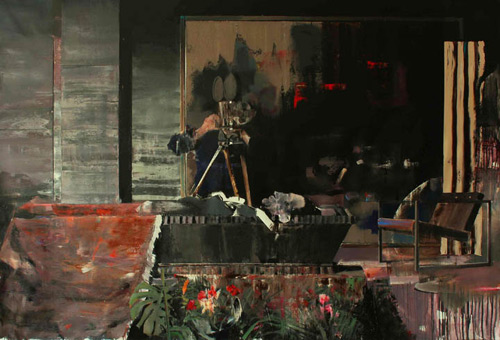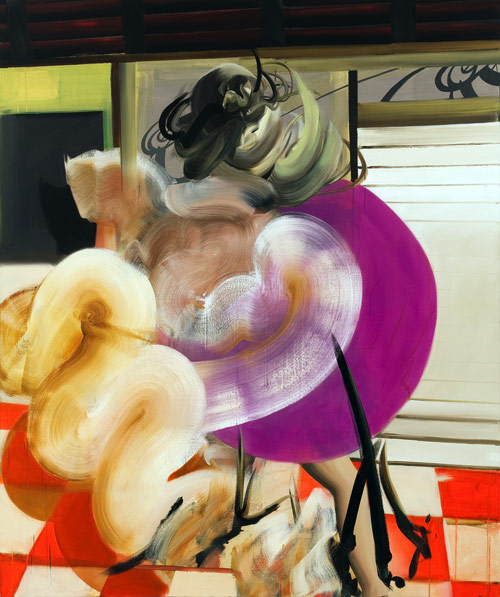Monday, August 30, 2010
Sura CXI: "We're gonna have some problems."
Thanks, asshole. Way to make my native state an easy target for religious extremism, and bumping us up on the retaliation list, past the Mohammad caricaturists.
Sunday, August 29, 2010
Wednesday, August 25, 2010
Tuesday, August 24, 2010
Scholarship Overhaul (front page)
"After all, the development of peer review was an outgrowth of the professionalization of disciplines from mathematics to history — a way of keeping eager but uninformed amateurs out."
Scholars Test Web Alternative To the Venerable Peer Review
What they won't tell you is how much, surely where the humanities are concerned, the (quite often "uninformed") academy owes to independent scholarship by dedicated, acutely studied, and non-funded outsiders who perhaps, if placed before a tenure panel, would stand out as anything but amateurs. I don't mean to say that the bureaucracy and benchmarks should completely disappear from selective reviewing, but if the professional gatekeepers want their institutions to continue providing dynamic, challenging, and (yes) with-it learning opportunities, they should be less afraid of having to trudge through the great influx of truly original ideas and perspectives that exist with or without academist sanctity. Of course, such a meager proposal would require professionalized scrutiny before even being considered, since, as Laurie Anderson puts it:
"Only an expert can see there's a problem,
Only an expert can deal with the problem."
Scholars Test Web Alternative To the Venerable Peer Review
What they won't tell you is how much, surely where the humanities are concerned, the (quite often "uninformed") academy owes to independent scholarship by dedicated, acutely studied, and non-funded outsiders who perhaps, if placed before a tenure panel, would stand out as anything but amateurs. I don't mean to say that the bureaucracy and benchmarks should completely disappear from selective reviewing, but if the professional gatekeepers want their institutions to continue providing dynamic, challenging, and (yes) with-it learning opportunities, they should be less afraid of having to trudge through the great influx of truly original ideas and perspectives that exist with or without academist sanctity. Of course, such a meager proposal would require professionalized scrutiny before even being considered, since, as Laurie Anderson puts it:
"Only an expert can see there's a problem,
Only an expert can deal with the problem."
Labels:
academia,
democratization,
education,
information theory,
scholarship,
tenure
Monday, August 23, 2010
Ointment
"It is the arbitrary fact, and not any quality of wisdom literature, which creates the impact of the poets. The 'shock of recognition,' when it is anything, is that. If we can hold the word to its meaning, or if we can import a word from elsewhere—a collective, not an abstract noun, to mean 'the things that exist'—then we will not have on the one hand the demand that the poet circumstantially describe everything that we already know, and declare every belief that we already hold, nor on the other hand the ideal of the poet without any external senses at all." -George Oppen, "The Mind's Own Place"
Rejoinder
Yesterday's post was/is a temporal fleshing out of an as yet inarticulate, incomplete sense that I have (and for as long as I can remember have had, but cannot explain) toward buzz-language hype and image-intensive capital. It therefore isn't the cogent-est thing I've written. Many proponents of the concepts and movements referenced (without precedent) would argue that (1) such indicative packaging/classification is only (and, after the mid-century mark, self-admittingly, though perhaps not ironically) symptomatic, (2) the most deliberately "uncreative" and de-authorial art is at the end of the day artificial and (as an excuse) cannot be faulted for shamelessly displaying its pronounced presence upon a shelf, and that (3) we will not and never could avoid creative transmission (ambiguous term, but since we fie on expression...) through the image or object, and that abstraction/digression/conceptualization only renews the cognitive diffusion for a time before even the chance/contingent walls, floor, and spaces of context become art "objects", academicized "practices", and nouns. And can I really profess intellectual honesty, when my own blog title refers to the sporadic and informal nature of these posts?
The point is that I still cannot be satisfied (as though I should be, right?) with the attitude best described/excused, I think, in Sontag's preface to Barthes' Writing Degree Zero: "Someday perhaps a demystification of the myth of 'art' (as an absolute activity) will be possible and will take place... At this stage, only new myths can subdue—even for the brief time to permit contemplation—the old myths which move convulsively about us." And, for the moment, what to make of our myths (ours as in theirs: the avant-gardists, the conceptualists, the New Left, who itself is convincing, yet so rife)? How to parse through those that demystify, and re-mystify? What would the artistic community make of the opinion that many such delineated titles/distinctions constrain and control interests and stand in the way of objective (or solipsistically subjective) interpretation, and therefore we might do well to be rid of them? It's an unheard discussion, thus far, what with the partisan gape wrought by a politics/poetics that cannot seem to address their own anachronisms.
The point is that I still cannot be satisfied (as though I should be, right?) with the attitude best described/excused, I think, in Sontag's preface to Barthes' Writing Degree Zero: "Someday perhaps a demystification of the myth of 'art' (as an absolute activity) will be possible and will take place... At this stage, only new myths can subdue—even for the brief time to permit contemplation—the old myths which move convulsively about us." And, for the moment, what to make of our myths (ours as in theirs: the avant-gardists, the conceptualists, the New Left, who itself is convincing, yet so rife)? How to parse through those that demystify, and re-mystify? What would the artistic community make of the opinion that many such delineated titles/distinctions constrain and control interests and stand in the way of objective (or solipsistically subjective) interpretation, and therefore we might do well to be rid of them? It's an unheard discussion, thus far, what with the partisan gape wrought by a politics/poetics that cannot seem to address their own anachronisms.
Sunday, August 22, 2010
Vogue (Caution: feeling unusually reactionary today)
Many of the titles reviewed by Steven Heller in this Sunday's Book Review (all related in some way to graphic design) make the "I want that!" list. What struck me enough to blurg here, though, was one of his comments on the facsimile republishing of THE FIRST SIX BOOKS OF THE ELEMENTS OF EUCLID: In Which Coloured Diagrams and Symbols Are Used Instead of Letters for the Greater Ease of Learners. Oliver Byrne's text (or graphic language, rather) employs rebus illustrations to elaborate on the concepts of Euclidean geometry with predictable 1847 primary-chrome, two-dimensional charm. Heller's comment:
"Given its 'less is more' layout and primary-color palette — red, blue, yellow, black — THE FIRST SIX BOOKS OF THE ELEMENTS OF EUCLID... prefigures the art and design of 20th-century avant-garde movements. Yet although the illustration on the title page is the spitting image of a de Stijl and Bauhaus design, the mid-19th-century publishing date disqualifies it from being 'modern' in the Museum of Modern Art sense of the word."
Far from critiquing those two radically minimalist visual art movements, the reviewer subtly refers to the peculiarly "modern" conceptual fetish for recycled content that, in a panoramic inhale, cannot be located without a hot "new" label denoting the current aesthetic fashion. (Heller also shares my obnoxious compulsion for quotation marks without specific indication of an actual source). Which leads me to an old, but as yet unsated complaint: the inundatingly prevalent 20th century habit of unnecessary (and only sometimes deserved) nomineering—sorry, seemed apt—, especially by Modern avant-gardists who by mid-century (though pre-dated, I think, by de Saussurean linguistics, but certainly by Wittgenstein) made such a stink about the imposing, capitalist ethos of NAMING, and yet were often themselves strong proponents, if not originators, of arguably undue classifications; from art coteries, to genre, to poetic practices, concepts, etc. I can appreciate Charles Bernstein's "Nude Formalism" as (I think) a satiric usage, but his own self-promoting "radical legibility" lines up right alongside other neologisms that (rather than draw attention to the thing/idea in question) stand vertically as monumental signposts of and for themselves: Concrete poetry (understood, but did George Herbert need a title to elucidate his typographical innovation?); the Objectivists (whose practices I esteem to Stein-esque heights, but who obviously knew racketeering); the Beats (and Kerouac never did hear the end of it); Language Poetry (at least not an audacious title for this disparate group of writers, though it's somehow considered distinct from the practices of Stein). I don't mean to rail against the clutter of conceptual mythologies and strikingly similar/overlapping -isms, as though they just plain bother me. If artists want to corral an audience through the capitalist marketing practice of ostentatious packaging, that's fine, so long as they recognize their complicit role in product/service pandering. But save the radical-aversion-to-capital-interests-and-the-overdetermined-object bit. It isn't parody without an object to inveigh. It's cute is what it is. Cute enough to fetishize, to sell. And I don't mean dollars, but sensibility. (The battle lines are drawn in the surrounding ethos, aren't they?). Help me out, name-manufacturers: why?
"Given its 'less is more' layout and primary-color palette — red, blue, yellow, black — THE FIRST SIX BOOKS OF THE ELEMENTS OF EUCLID... prefigures the art and design of 20th-century avant-garde movements. Yet although the illustration on the title page is the spitting image of a de Stijl and Bauhaus design, the mid-19th-century publishing date disqualifies it from being 'modern' in the Museum of Modern Art sense of the word."
Far from critiquing those two radically minimalist visual art movements, the reviewer subtly refers to the peculiarly "modern" conceptual fetish for recycled content that, in a panoramic inhale, cannot be located without a hot "new" label denoting the current aesthetic fashion. (Heller also shares my obnoxious compulsion for quotation marks without specific indication of an actual source). Which leads me to an old, but as yet unsated complaint: the inundatingly prevalent 20th century habit of unnecessary (and only sometimes deserved) nomineering—sorry, seemed apt—, especially by Modern avant-gardists who by mid-century (though pre-dated, I think, by de Saussurean linguistics, but certainly by Wittgenstein) made such a stink about the imposing, capitalist ethos of NAMING, and yet were often themselves strong proponents, if not originators, of arguably undue classifications; from art coteries, to genre, to poetic practices, concepts, etc. I can appreciate Charles Bernstein's "Nude Formalism" as (I think) a satiric usage, but his own self-promoting "radical legibility" lines up right alongside other neologisms that (rather than draw attention to the thing/idea in question) stand vertically as monumental signposts of and for themselves: Concrete poetry (understood, but did George Herbert need a title to elucidate his typographical innovation?); the Objectivists (whose practices I esteem to Stein-esque heights, but who obviously knew racketeering); the Beats (and Kerouac never did hear the end of it); Language Poetry (at least not an audacious title for this disparate group of writers, though it's somehow considered distinct from the practices of Stein). I don't mean to rail against the clutter of conceptual mythologies and strikingly similar/overlapping -isms, as though they just plain bother me. If artists want to corral an audience through the capitalist marketing practice of ostentatious packaging, that's fine, so long as they recognize their complicit role in product/service pandering. But save the radical-aversion-to-capital-interests-and-the-overdetermined-object bit. It isn't parody without an object to inveigh. It's cute is what it is. Cute enough to fetishize, to sell. And I don't mean dollars, but sensibility. (The battle lines are drawn in the surrounding ethos, aren't they?). Help me out, name-manufacturers: why?
Labels:
conceptual mythology,
fetishism,
language,
neologism
Saturday, August 21, 2010
Adventures in abs(ex)traction
Simple, unabashed legibility, a paramarketable aesthetic, perhaps, or what else to fall back upon in times where "nothing [not even the grotesquely deviant] is sacred [commercially uncontaminated]." I mean, godspeed Ann Liv Young, but have you seen the new piece by Old Spice?




 © Greg Eason
© Greg Eason




 © Greg Eason
© Greg Eason
Labels:
abstraction,
decontextualization,
landscape,
representational,
space,
subject,
visual art
No "art" attached
But I'm interested to see if there's any cultural engagement by creative content on the peculiar antagonistic corollary of radical-extremism and social stigmas in our society today. Or how does one say "This is not American.. is it?"?
U.S. Anti-Islam Protest Seen as Lift for Extremists
-“'For the first time, anti-Islamic rhetoric has gone mainstream,' he said. 'What this really does is weaken the moderates and undermine their credibility.'”
(Note: the potential for indicative transference in "their credibility")
U.S. Anti-Islam Protest Seen as Lift for Extremists
-“'For the first time, anti-Islamic rhetoric has gone mainstream,' he said. 'What this really does is weaken the moderates and undermine their credibility.'”
(Note: the potential for indicative transference in "their credibility")
Labels:
aesthetic inadequacy,
democracy,
extremism,
intolerance,
propaganda-fuel
Monday, August 16, 2010
More (to love)
Don't expect much content beyond visual art links these next few weeks, unless you want frequent articles on any and all things W.C. Williams (current research project). Didn't think so. Hit up Wolfe von Lenkiewicz, if you aren't yet burnt on religious/consumerist icono-pastiche à la Enrique Chagoya (which I am not), and particularly his "Plura Culture" and "The Descent of Man" series. If you like, make sure to bookmark it before Verizoogle hides it under a heap of commercial rubble that you didn't yet know you really wanted.


Tuesday, August 10, 2010
Things to love:
-Fresh caught salmon over mixed greens
-The Grecian Urns' new "Love Dream"
-Florida weather
-DVR (roommate is a cable guy, thanks roommate)
-Cheap Malbec from Mendoza
-Getting caught up in:
-The Grecian Urns' new "Love Dream"
-Florida weather
-DVR (roommate is a cable guy, thanks roommate)
-Cheap Malbec from Mendoza
-Getting caught up in:
Sunday, July 11, 2010
Greater informational access=empowering.. and intractabilitating
I should return to this subject in the future, though it's apparent from the impatient glints of (often less than lucid) commentary on my part that a substantial interest in blogging has never skyrocketed. But I (also apparently) like making excuses, whether or not they are needed. My second round GRE is in two days, so I'll let the reader's encounter with the report do its own thing... That sounds socially-beneficial, right?
Computers at Home: Educational Hope v. Teenage Reality
The bewildering question, I think, isn't, "who didn't think One Laptop Per Child would nourish mind-capital for the respectively less informed," but rather, "what does this make (to outsiders) of the freedom of information philosophy we so dearly pride against a hyper-regulatory inaccess paranoia a la Beijing?"
-“there was no evidence linking technology immersion with student self-directed learning or their general satisfaction with schoolwork.”
Computers at Home: Educational Hope v. Teenage Reality
The bewildering question, I think, isn't, "who didn't think One Laptop Per Child would nourish mind-capital for the respectively less informed," but rather, "what does this make (to outsiders) of the freedom of information philosophy we so dearly pride against a hyper-regulatory inaccess paranoia a la Beijing?"
-“there was no evidence linking technology immersion with student self-directed learning or their general satisfaction with schoolwork.”
Saturday, May 29, 2010
Blindly co-opted, complicit Barthesian, or too lazy (impatient) to explain why so?
"Nobody will deny that there is such a thing, for instance, as a writing typical of Esprit or of Les Temps Modernes. What these intellectual modes of writing have in common, is that in them language, instead of being a privileged area, tends to become the sufficient sign of commitment. To come to adopt a closed sphere of language under the pressure of all those who do not speak it, is to proclaim one's act of choosing, if not necessarily one's agreement with that choice. Writing here resembles the signature one affixes at the foot of a collective proclamation one has not written oneself. So that to adopt a mode of writing—or, even better, to make it one's own—means to save oneself all the preliminaries of a choice, and to make it quite clear that one takes for granted the reasons for such a choice. Any intellectual writing is therefore the first of the 'leaps of the intellect'. Whereas an ideally free language never could function as a sign of my own person and would give no information whatsoever about my history and my freedom, the writing to which I entrust myself already exists entirely as an institution; it reveals my past and my choice, it gives me a history, it blazons forth my situation, it commits me without my having to declare the fact." -Roland Barthes, "Writing Degree Zero"
(The real excuse is that Roland Garros devours more of my attention at the moment)
(The real excuse is that Roland Garros devours more of my attention at the moment)
Labels:
commitment,
language,
political mythology,
significance,
writing
Saturday, May 22, 2010
Art/Book as [material, perishing, self-defacing] object
disappearing book no. 1 from disappearing books on Vimeo.
© Stacy Blint 2010, http://disappearingbooks.com/
(snatched from Silliman)
Subscribe to:
Posts (Atom)








